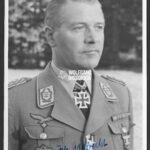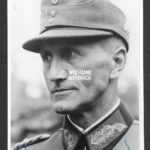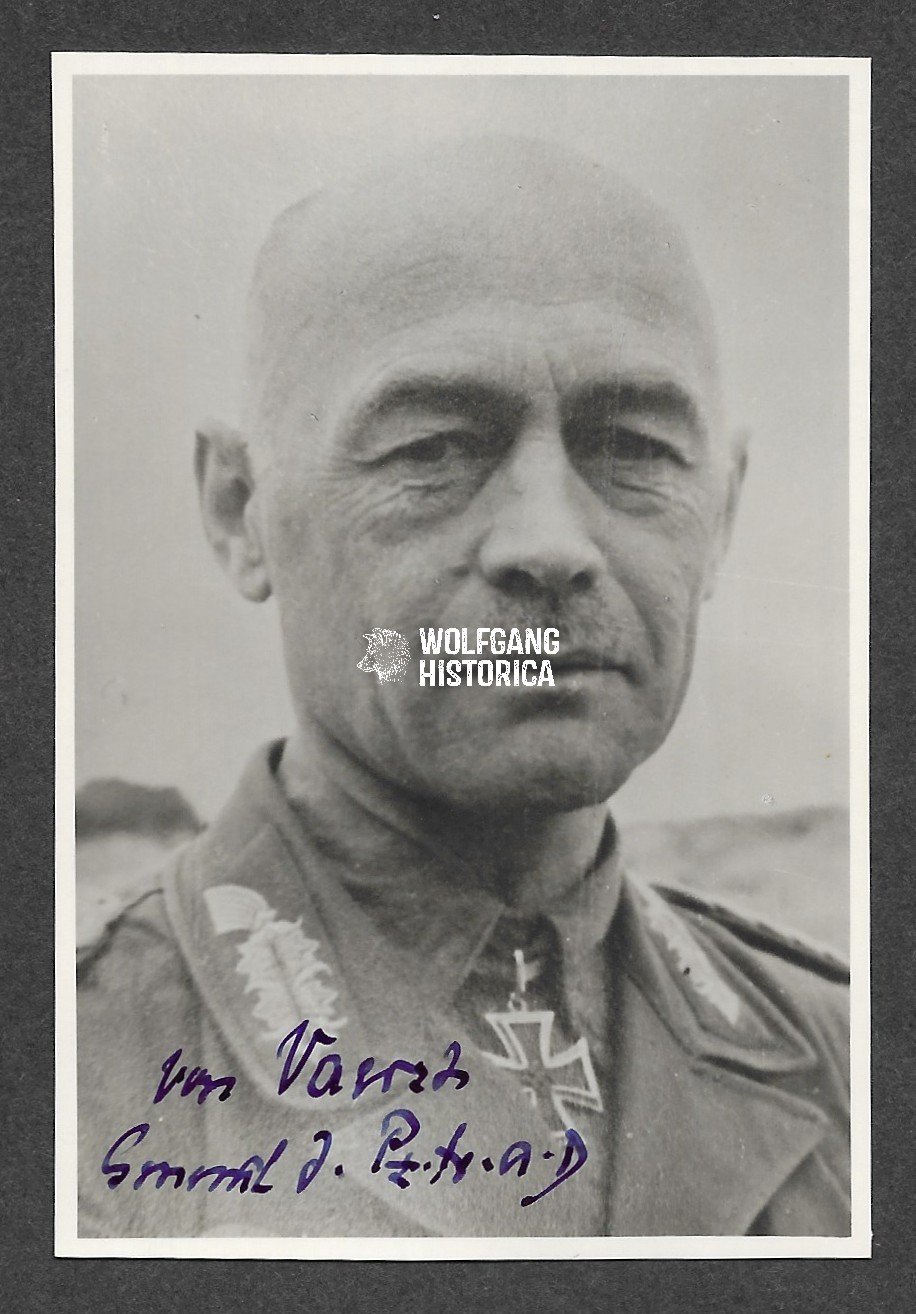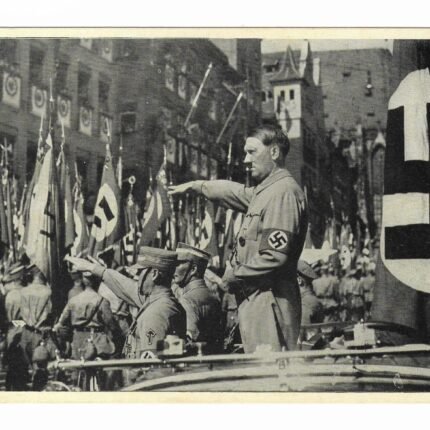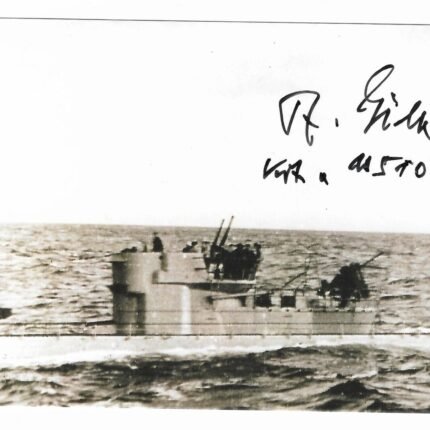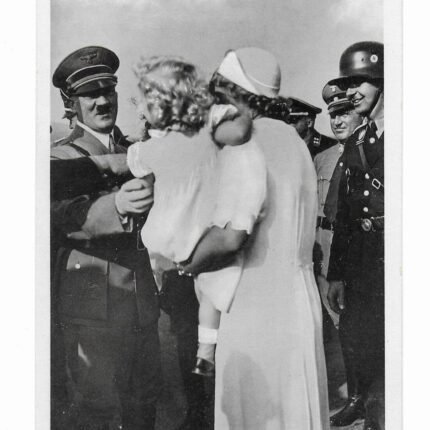Gustav Friedrich Julius von Vaerst – 2. Schützen-Brigade
€55,00
Original Postwar Signature on a Postwar Photo of Gustav Friedrich Julius von Vaerst. General der Panzertruppe Gustav von Vaerst (19 April 1894, Meiningen † 10 October 1975, Wiesbaden) was a German officer who rose to the rank of General der Panzertruppe in World War II. He served with distinction as both a frontline commander and later as commander of 5. Panzerarmee in North Africa, where he succeeded Generaloberst Hans-Jürgen von Arnim in May 1943. Shortly after, he was taken prisoner when Axis forces in Tunisia capitulated.
Awards and Decorations:
-
Ritterkreuz des Eisernen Kreuzes – 30 July 1940 as Oberst und Kommandeur of the 2. Schützen-Brigade.
-
Citation (30.08.1940):
“Oberst von Vaerst distinguished himself in an outstanding way throughout the whole campaign in the West. In this capacity he distinguished himself through ruthless dedication during the crossing of the Maas river as well as in subsequent fighting. His calm and masterful command abilities (usually wielded whilst under enemy fire) inspired his subordinates to give their best in all this time. Oberst von Vaerst also showed noteworthy bravery during the capture of the Boulogne fortress.”
-
-
Iron Cross (1914) 1st and 2nd Class.
-
Clasp to the Iron Cross (1939) 1st and 2nd Class.
-
Other Wehrmacht campaign and service awards.
Career Highlights:
-
Entered the Imperial German Army in 1913, serving throughout WWI.
-
Continued his career in the Reichswehr and later the Wehrmacht, specializing in mechanized forces.
-
Promoted to General der Panzertruppe, commanded 2. Schützen-Brigade during the 1940 Western Campaign, later leading higher Panzer formations.
-
In May 1943, appointed commander of 5. Panzerarmee in Tunisia; became a POW when Axis forces surrendered to the Allies shortly after.
-
Remained in captivity until 1947.
Postwar Life:
After his release, von Vaerst lived in Wiesbaden until his death in 1975.
Item Details:
-
Authentic postwar signature of General der Panzertruppe Gustav von Vaerst.
-
Signed on a postwar photograph. ID-size.
-
Condition: Very good, clear autograph.
Collector’s Note:
As the last commander of 5. Panzerarmee in North Africa, von Vaerst’s career is closely tied to the final phase of the Axis struggle in Tunisia. His Ritterkreuz citation for leadership in France 1940 adds further depth to his profile, making his signature a highly desirable addition for collectors of Panzer leaders and Afrika Korps history.
Out of stock
Original Postwar Signature on a Postwar Photo of Gustav Friedrich Julius von Vaerst. General der Panzertruppe Gustav von Vaerst (19 April 1894, Meiningen † 10 October 1975, Wiesbaden) was a German officer who rose to the rank of General der Panzertruppe in World War II. He served with distinction as both a frontline commander and later as commander of 5. Panzerarmee in North Africa, where he succeeded Generaloberst Hans-Jürgen von Arnim in May 1943. Shortly after, he was taken prisoner when Axis forces in Tunisia capitulated.
Awards and Decorations:
-
Ritterkreuz des Eisernen Kreuzes – 30 July 1940 as Oberst und Kommandeur of the 2. Schützen-Brigade.
-
“Oberst von Vaerst distinguished himself in an outstanding way throughout the whole campaign in the West. In this capacity he distinguished himself through ruthless dedication during the crossing of the Maas river as well as in subsequent fighting. His calm and masterful command abilities (usually wielded whilst under enemy fire) inspired his subordinates to give their best in all this time. Oberst von Vaerst also showed noteworthy bravery during the capture of the Boulogne fortress.”
-
Career Highlights:
-
Entered the Imperial German Army in 1913, serving throughout WWI.
-
Continued his career in the Reichswehr and later the Wehrmacht, specializing in mechanized forces.
-
Promoted to General der Panzertruppe, commanded 2. Schützen-Brigade during the 1940 Western Campaign, later leading higher Panzer formations.
-
In May 1943, appointed commander of 5. Panzerarmee in Tunisia; became a POW when Axis forces surrendered to the Allies shortly after.
-
Remained in captivity until 1947.
Postwar Life:
After his release, von Vaerst lived in Wiesbaden until his death in 1975.
Item Details:
-
Authentic postwar signature of General der Panzertruppe Gustav von Vaerst.
-
Signed on a postwar photograph. ID-size.
-
Condition: Very good, clear autograph.
Collector’s Note:
As the last commander of 5. Panzerarmee in North Africa, von Vaerst’s career is closely tied to the final phase of the Axis struggle in Tunisia. His Ritterkreuz citation for leadership in France 1940 adds further depth to his profile, making his signature a highly desirable addition for collectors of Panzer leaders and Afrika Korps history.

